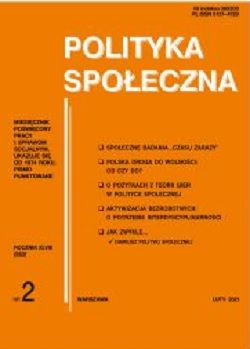
- Review of social research in Poland on the SARS-CoV-2 pandemic in the light of the fuzzy reasoning paradigm
The article presents the results of the secondary analysis of qualitative and quantitative data in relation to social research carried out in Poland during the pandemic. The research results were introduced on the basis of analyzes of 180 projects carried out by scientific and commercial institutions in the period from January to May 2020. The aim of the project is to present generalizations for patterns of conduct in the implementation of empirical research for social researchers undertaking the challenges of identifying the phenomena accompanying the SARS-CoV-2 pandemic . We are interested in the possibility of drawing conclusions that go beyond individual research projects carried out in the social area. The conclusions we recommend relate to the following issues: mitigating the polarization of social attitudes dynamically changing during a pandemic, practical solving - and not only diagnosing - problems that appear incovid reality and deficits of theoretical assumptions accompanying research works .
- Construction work in the light of game theory. An empirical study
The article discusses the problem of queuing for elevators and delays in construction. While conducting the research, the author found employment as a construction worker at the construction site of a skyscraper in Poland. The research was conducted using implicit participant observation. The theoretical background of the analyzes was the theory of games.
- Lost heritage of "Solidarity"
The text is devoted to the legacy of Solidarity, taking into account two types of freedom: negative and positive. The basic thesis is that "Solidarity" achieved historic success in the sphere of negative freedom, but failed to achieve similar success in the sphere of positive freedom, which was quickly forgotten after 1989. The forgetfulness of positive freedom was accompanied by the fears of the former leaders of "Solidarity", who were at the forefront of the systemic transformation, that NSZZ "Solidarność" would torpedo the system changes by way of union re-recovery.
- Social, legal and economic barriers to professional activation of selected groups of the unemployed
There are as many determinants of registration with the employment office as there are individual life situations of unemployed people. There are also numerous barriers to professional activation in individual groups of unemployed people registered with labor offices. Barriers to economic activation of the researched groups of the unemployed can be divided into three categories: social, legal and economic. The aim of this study is to present an interdisciplinary view on the complex issues of professional activation and barriers to taking up employment of selected groups of the unemployed in social, legal and economic terms. This article is based on many years of empirical research conducted in employment offices.
Polityka Społeczna (Social Policy) - the whole list







